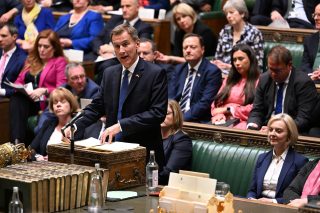The turbulent economic events of the past several weeks will be the backdrop for what is expected to be the most intriguing Budget breakfast briefing yet to be hosted by The Herald.
Readers will get the opportunity to discuss and question the implications of newly-installed Chancellor Jeremy Hunt’s economic plans following his move earlier this week to scrap most of the measures put forward in September by his predecessor, Kwasi Kwarteng. On hand will be a group of expert panellists chaired by Herald columnist and political commentator Brian Taylor, who will provide a summary of the key issues raised by the Chancellor’s latest plans for taxation, benefits and spending.
The Herald Budget Briefing will begin at 9am on November 1, the morning after Mr Hunt delivers his Budget, and is sponsored by Azets UK, Rathbones, and Wright Johnston & Mackenzie LLP (WJM).
“The mini-Budget announcement followed by changes and U-turns created uncertainty in the economy, making it difficult to run a business,” Azets tax partner and panel member Katy Thomson said.
READ MORE: Financial firestorm subsides but new Chancellor must further quell investors
“For businesses to grow, SME business leaders need support and certainty at a basic economic level. The recent statement on October 17 will no doubt have businesses and individuals wondering how a reversal on cuts will directly impact them.”
Markets were thrown into chaos after Mr Kwarteng delivered his mini-Budget on September 23, which included billions in unfunded tax cuts designed to spur economic growth. This was to have been followed by a full Budget statement, including crucial analysis of the public finances by the Office for Budget Responsibility (OBR), on November 23.
However, in an effort to quell the ensuing chaos Mr Kwarteng brought the date of that announcement forward to October 31 and ditched one of his key measures, which would have abolished the top 45p rate of income tax. He was sacked as Chancellor on October 14 and replaced by Mr Hunt, who quickly reversed most of the other tax cuts in the mini-Budget and scaled back dramatically on Government support for household energy prices.
Rathbones asset allocation strategist Oliver Jones said although most of the measures in the mini-Budget will now never see the light of day, the fallout could leave lasting scars as uncertainty about the political and policy outlook in the UK will likely remain for the foreseeable future.
“This uncertainty adds, at the margin, to the headwinds for business investment and therefore long-term growth in the UK,” he said. “Private investment in the UK has already been weak for years, stagnating in real terms and trailing other major economies in the period of continuous instability over the UK’s trade policy since 2016.
“In addition, the fallout revealed previously under-appreciated financial stability risks in the pensions industry. Pension schemes may come under pressure to change the way they operate further ahead.”
Grant Johnston, partner and head of wealth planning at WJM, said: “The upcoming Budget is going to be incredibly important so it’s great to be part of this event where people will have the opportunity to discuss the key announcements with a variety of experts from multiple sectors across Scotland.”
Ms Thomson at Azets added: “The Herald Budget Briefing 2022 will allow for business leaders to come together to discuss the immediate impact of these announcements on business and how leaders can navigate the months ahead, maximise reliefs, plan and move forward with strategic plans.”
Tickets for the Herald Budget Briefing 2022 cost £10 plus VAT. To reserve a place, email events@newsquestscotlandevents.com.

